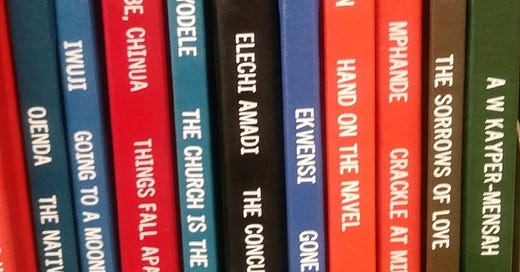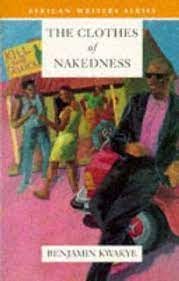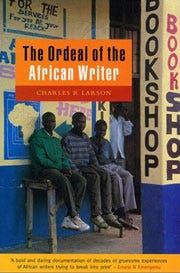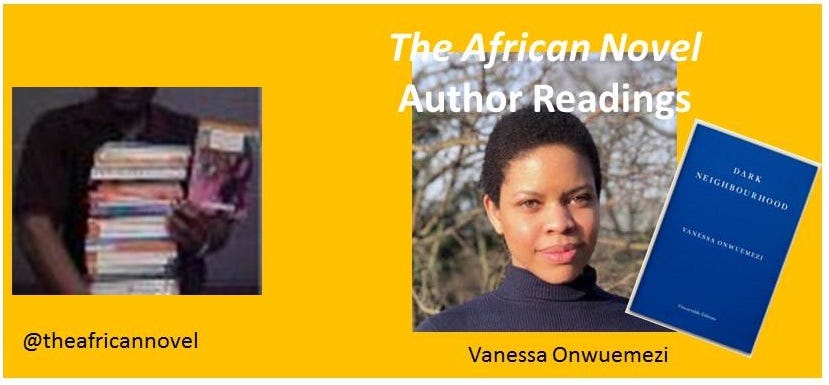CONTENTS
Newsletter Editor's Message
Memorable Lines: The Clothes of Nakedness
Bookshelf: A Reading List
Common Ground
Writers Showcase: Charles Larson
Book Review: The Ordeal of the African Writer
Author Readings: Vanessa Onwuemezi
Book Events & More
Our Radio Archives
Off the WRITE Path
African Proverb: Congolese
Newsletter Editor’s Message
I am delighted beyond words to welcome you to the first edition of The African Novel electronic newsletter in this format.
We promise to deliver to your inbox every month (the frequency may change without notice) unique contents that you cannot get from anywhere else, in print or online. This issue and subsequent ones will be unlike our first experimentation back in 2008 and 2009 — full of richness.
We do not make this promise lightly as a team of novelists, writers, journalists, and college professors — with feedback from critical and well-informed readers.
In this medium, we shall take great pride in celebrating the rich heritage of Africa's literary culture. This unique digital newsletter aims to feed the hunger of lovers of African letters from past, present, and futuristic perspectives.
We have already established our passion for this calling over the past at least two decades -through Africa-centered radio programs on-air and online and through e-newsletters. It is our hope that this new medium will re-connect us with our previous audience and expand it, thanks to new technological resources available to us today like Facebook, Instagram, and Twitter (@theafricannovel).
Remembering Charles Larson, an “Old African Hand”
Charles Larson was an Emeritus Professor of African Literature at American University in Washington, D.C. He died in May 2021. It is apropos to pause here and remember a man who first encountered an African novel as a 24-year-old American Peace Corps volunteer stationed a few kilometers from Chinua Achebe’s hometown of Ogidi in southeastern Nigeria. He read Achebe’s Things Fall Apart in 1962, and the rest, as they say, was history for Larson, whose storied career as a pioneering scholar of African and African-American literature was all credited to that life-changing experience in Nigeria. Larson considered himself an “old African hand.” We honor him in this debut newsletter by returning to a Q&A with him and a review of one of his many books in 2008.
Enjoy!
Cyril Ibe, Ph.D
P.S. Perhaps a friend forwarded this email to you. Sign up to receive The African Novel directly in your inbox.
Memorable Lines
"He moved slowly, like a bored chameleon. It was as though his steps were a chore performed with difficulty but necessary for the accomplishment of compelling objectives. At his sides, his arms swung steadily, unhurried, like noiseless pendulums. The only swiftness in his movement was the sharp motion of his tongue, flickering through his lips and back again."
— from The Clothes of Nakedness (Heinemann, 1999) by Benjamin Kwakye
Bookshelf
What writers and readers of African fiction are reading:
Writer/Poet Vanessa Onwuemezi (London): The Palmwine Drinkard by Amos Tutola; Lote by Shola Von Reinhold.
Novelist Cyprian Josson (Chartres, France): Ladies Trip by Fanny Enoh; Burning Grass by Cyprian Ekwensi.
Novelist Benjamin Kwakye (Michigan, USA): Chronicles from the Land of the Happiest People on Earth by Wole Soyinka; The Love Songs of W.E.B. Du Bois by Honoree Fanonne Jeffers.
Cyril Ibe (Ohio, USA): Things Fall Apart (in French)/Le Monde s’effondre by Chinua Achebe; Songs of Benjamin by Benjamin Kwakye.
(As a reader or subscriber of this newsletter, you can submit titles of African fiction and other books on your reading list. Tell us in what part of the world you reside).
Common Ground
“How Langston Hughes has influenced generations of South African writers.”
Writers Showcase
Remembering Charles R. Larson (1938-2021)
By Benjamin Kwakye
Photo courtesy of American University
Charles R. Larson’s The Ordeal of the African Writer is a must-read. Larson combines thorough research, writers’ personal accounts, and perceptive analyses to expose both the overwhelming odds facing the African writer and the writer’s heart-warming endurance, characteristic of the continent itself. Larson’s account is both depressing and inspiring. But this quality and the book’s blend of accessibility with numerous accounts of writers’ personal experiences give it a certain human quality. To suppose, however, that aspiring writers might be discouraged from pursuing the craft after reading the book misses the point. Amid overwhelming difficulties, African writers continue to endure and pursue their art. Obviously, such writers are inspired by something greater than their difficulties. And herein lies the triumph and hope for the present and the future. It is hope somewhat captured in Larson’s suggestion for the establishment of a Pan-African publishing house devoted to the publishing and promotion of African literature. Even if, given the history of failed attempts in the past, this suggestion might be deemed utopian, it still calls for a positive rejoinder.
It is evident from reading The Ordeal of the African Writer that you have a strong personal interest in African literature. How did this interest develop?
My strong personal interest in African literature goes back to 1962, when I arrived in Nigeria as a Peace Corps volunteer and taught English at a boys’ secondary school in southeastern Nigeria (Oraukwu Grammar School, Oraukwu) for two years. But I’m equally interested in this material because African writers need to be read more widely in the United States. For close to 40 years, I’ve worked to get their books in print in the U.S.
What motivated you to write the book, and what do you hope it will accomplish?
I was motivated to write The Ordeal of the African Writer out of a concerned feeling that African writers are not on an equal playing field with those in the West. I hope the book will convince Western publishers to publish African writers and do everything they can do to nurture African literature.
In parts, The Ordeal of the African Writer is very disheartening, especially some of the heartbreaking personal accounts so vividly summarized in the book. Do you have any concerns that an aspiring African writer would read it and decide that it’s not worth the trouble?
“African writers will always write, thank God. But they need to know that there are obstacles which they will face that have nothing to do with the quality of their writing. In other words, don’t give up! Talented African writers will eventually find publishers interested in their work.”
What, if anything, surprised you the most about the difficulties of the African writer?
I am surprised by nothing in Africa or African writers. The continent is fabulous, and the people are wonderful – given proper leadership, there will be a true African Renaissance.
What makes the African writer endure amid all the challenges, and is any of this unique to his or her situation?
All writers survive on hope for their own work and for their countries, a double burden for African writers. I could be crass about this and say that African writers (living in Africa) can live on less than Western writers living in Europe or America, where things are more expensive. But that’s not fair. African writers need the same things that Western writers do: recognition, readers (their own people), and money.
Short of the Pan-African publishing house that you suggest to publish and promote African writing, is there anything that can be done to improve the situation?
Yes, governments can say that writers matter. Why can’t the Nigerian government issue a postage stamp with Amos Tutuola’s face on it? Why can’t Guinea issue one for Camara Laye? What would that cost? Why can’t African nations honor their artists (not just writers)?
You argue clearly that despite the difficulties, there’s a great deal of talent on the continent. Still, without strong support systems, what, in your view, is the future of African writing and publishing?
The future of African writers is not good. Books are so expensive in Africa that most Africans cannot afford to buy them. Last year, Things Fall Apart sold for about $10 in the United States and 2,250 naira ($18 equivalent) in Nigeria. Thus, Chinua Achebe (to over-simplify the issue) lives where his readers are. Bottom line: How can African writers become known in their own countries if their fellow citizens cannot afford to buy their books?
Do you see the Internet as an option for writers from Africa to get published and find a wider audience?
No, I do not see the Internet as an option for African writers — not at the current time. Too many African countries do not have reliable sources of electricity and phone lines. What does an internet connection cost in Mali? Who has access to these luxury items? Bottom line: produce books that Africans can purchase for 25 cents or 50 cents and then you’ll have African readers.
Some have criticized your book for over-dramatizing the difficulties of the late Nigerian writer Amos Tutuola in the first chapter of the book. The critics say that you pay too much attention to the inability of African writers to support themselves when, in fact, that may not be unique to them. Your response?
Amos Tutuola was NOT appreciated by his people. That cannot be denied. Nigerians ignored him, except during those times when the press called attention to his obscurity. He died in poverty; a collection had to be taken up (in the West) for his funeral. These are indisputable facts — and he was treated badly by his Western publishers. All writers everywhere want to be read by their people, and they want to earn enough money to live comfortably from their work. Tutuola was not read by his people, and he could not live comfortably from his work — indisputable facts.
Any closing message to the American audience about African literature?
Obviously, Africans living in the United States need to read African writers, but, more importantly, whenever they return home to their own countries, their suitcases should be filled with copies of books by African writers. Take books to Africa!
Benjamin Kwakye is the author of The Clothes of Nakedness (Heinemann) and The Sun by Night (African World Press). He was senior editor of “Book World” for Afriscope Radio and Afriscope Weekly, which featured reviews, and interviews with authors of Black titles. This Q&A was first published on The African Novel blog in 2008.
Book Review
Title: The Ordeal of the African Writer
Author: Charles R. Larson
Publisher: Zed Books
Reviewer: Benjamin Kwakye
Charles R. Larson’s The Ordeal of the African Writer is a must-read. Larson combines thorough research, writers’ personal accounts, and perceptive analyses to expose both the overwhelming odds facing the African writer and, like the continent itself, the writer’s heartwarming endurance. Larson’s account is both depressing and inspiring. But it is this quality and the book’s blend of accessibility with numerous accounts of writers’ personal experiences that give it an inescapable human quality.
A sampling of parts of the ordeal: repression of work and author, including imprisonment and risk of death, at the hands of governments sensitive to the power of books; publishing houses that fail or refuse to pay royalties; analytical tools that misunderstand works of African fiction; the writer’s own choice of language dilemma; neglect by Western readers; and the incapability of an impoverished African audience to support its writers. Surely, this stark catalog does not quite capture the extent of that ordeal.
To suppose, however, that aspiring writers might be discouraged from pursuing the craft after reading the book misses the point. Amid such overwhelming difficulties, African writers continue to write, endure and pursue their craft. It becomes obvious that such writers are inspired by something greater than their difficulties. And herein lies the triumph and hope for the present and the future. It is hope somewhat captured in Larson’s suggestion for the establishment of a Pan-African publishing house devoted to the publishing and promotion of African literature. Even if, given the history of failed attempts in the past, this suggestion might be deemed an extremely difficult task, it is still a summons that calls for a positive rejoinder.
The late Charles Larson was a professor of African and African-American literature at the American University in Washington, DC. He wrote a number of articles, reviews, essays, fiction, and non-fiction. Among his nonfiction works are The Emergence of African Fiction and Under African Skies: Modern African Stories.
Editor’s Note: Reviewer Benjamin Kwakye is The African Novel’s “Resident Novelist.”
Author Readings
Hear authors themselves reading from their works.
London-based writer and poet Vanessa Onwuemezi reads from her new collection of short stories titled Dark Neighborhood. (She will be featured in Writers Showcase in the second issue of The African Novel electronic newsletter. Stay tuned!)
Read more about Dark Neighborhood.
To order Dark Neighborhood.
Book Events & More…
In Person
Liberian poet, writer, African literature professor Patricia Jabbeh Wesley is a featured poet for the 20th Mercyhurst University Literary Festival at 7:30 p.m. on Thursday, April 21. Jabbeh Wesley’s published books include Praise Song For My Children: New and Selected Poems, When the Wanderers Come Home, and a children's book (In Monrovia, the River Visits the Sea).
For more information: https://www.mercyhurst.edu/events/literary-festival-patricia-jabbeh-wesley
Virtual
What: Reading by Author Vanessa Onwuemezi
When: March 10
Time: 5:30 p.m. EST
Sponsored by: Brown University’s Department of Literary Arts
Event instructions: The reading will be available via Zoom for the Brown University Department of Arts community. A video will be made available to the general public by March 16 at https://www.brown.edu/academics/literary-arts/events
Cost: Free
Email Contact: writing@brown.edu
Our Radio Archives
Coming soon: Offerings of rare, exclusive interviews and audio documentaries for our paid subscribers.
A partial list of archived Premium offerings:
Interview: Chinua Achebe biographer Ezenwa-Ohaeto
Interview: Nobel Laureate Wole Soyinka on his legendary cousin, Fela
Interview: The Black press in America
Interview: South African novelist Mark Mathabani
Audio Documentary: Eighty Gifts for Poet Laureate Gwendolyn Brooks
An audio tour of the Mandela House Museum in Soweto, South Africa
Interview: Ethiopian-Jewish Filmmaker Orly Malessa
Interview: U.S. filmmaker Ileen LeBlanc on Take Us Home, a documentary pic on the exodus of Ethiopian Jews to Israel.
Interview: American historian Edward Haas on slavery, the civil war, and the uncelebrated role of Blacks in the union army.
Interview: Herbert Martin, professor emeritus of English literature and African-American studies at the University of Dayton and co-editor of The Collected Novels of Paul Laurence Dunbar (Ohio University Press).
Off the WRITE Path
What authors are doing when they’re not penning a new novel:
Okey Ndibe muses about Nigerian politics.
Cyprian (Njoku) Josson directs a gospel group in Chartres, France, and organizes “Festival International de Gospel et Negro Spiritual de Chartres” in the historic French city.
African Proverb
"Little by little grow the bananas.”
-- Congolese proverb.
Our Team
Cyril Ibe, Ph.D., Editor (Ohio); Resident Novelist/Reviewer Benjamin Kwakye (Michigan); Nollywood Director/Filmmaker/Novelist Cyprian Josson (Chartres, France); Contributor/Writer Kabuika Kamunga (Minnesota).












